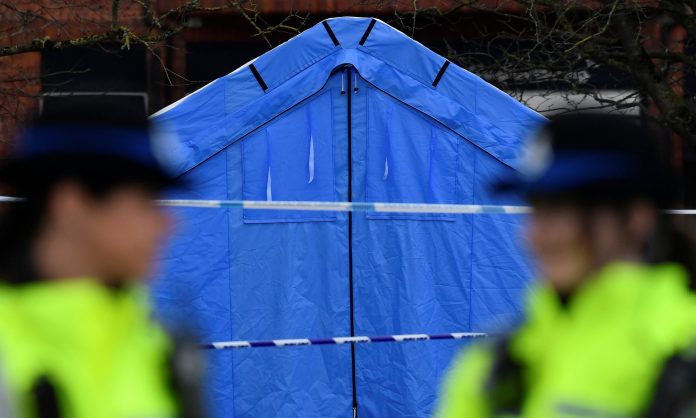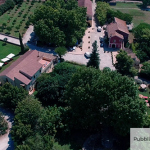The police officer who first came to the aid of the former Russian spy and his daughter after they were suspected of being poisoned by a nerve agent is talking to the authorities after his condition improved.
The home secretary, Amber Rudd, said he remained in a serious condition in hospital in Salisbury. Speaking after getting a morning briefing from the counter-terrorist police chief in charge of the investigation, Rudd said she was “more hopeful” about the officer’s health than the principal victims: the former Russian double agent Sergei Skripal, 66, and his daughter, Yulia, 33.
In an interview with ITV’s Good Morning Britain, Rudd said: “I’ve spoken to Mark Rowley this morning. The two targets are still in a very serious condition. The policeman is talking and is engaging, so I’m more optimistic for him. But it is too early to say. This is a nerve agent. We are still treating it as very serious.”
Speaking later on BBC Radio 4’s Today programme, Rudd said the officer was not in intensive care, but his condition was serious.
She also suggested that experts had identified the substance involved in what she described as a “very, very serious attack”. But she refused to be specific. “For now all we are going to say is that it is a nerve agent … It is very rare,” she said.
On Wednesday Rowley said all three victims were suffering from “exposure to a nerve agent”.
Detectives believe the Skripals were specifically targeted in a deliberate act, Rowley added.
Rudd said detectives had divided the investigation into three separate sites: the Skripals’ Salisbury home; the city’s Mill pub, where they had been drinking; and the Zizzi restaurant where they had eaten before collapsing on a park bench.
Unlike in the case of Alexander Litvinenko, poisoned with a slow-acting radioactive cup of tea, detectives got to the scene in Salisbury quickly. Hundreds of officers were now working around the clock, Rowley said. They were examining CCTV footage from the city centre and building a detailed timeline of events, he added.
Rudd, who is due to give a Commons update on the incident later on Thursday, refused to be drawn on whether Russia was responsible.
She said: “Whatever attribution takes place in the future we have to make sure we have all the evidence. The key thing is to have a cool head and allow [those investigating the incident] to continue that job, which they are doing with speed and with detail and with the support of professionalism we can expect.”
Asked if she believed if this was a Russian assassination attempt, Rudd said: “I’m determined to wait before any attribution [is made] until we have the facts. I’m completely confident that the police will be able to get that.”
Asked if the government was considering expelling Russian diplomats, Rudd said: “The government has a range of options, including people, including sanctions, including other things it can do, but at the moment we are not really speculating on what those are.”
She added: “There were lessons to be learned from Litvinenko … One of the things that has been learned from that particularly nasty incident is that we have to be absolutely meticulous about collecting the evidence, not responding to rumour but to fact. There is nothing soft about this approach, it’s about being absolutely clear about getting the evidence.”
Asked how the nerve agent was manufactured and brought into the UK, Rudd said: “These are all questions that I will want answered.”
The defence secretary, Gavin Williamson, told the programme that Russia was “becoming an ever-greater threat”.
He added: “Russia’s changing the way they actually fight and raise the level of conflict. We are seeing this in the north Atlantic as well – the amount of submarines that are operating, there’s a tenfold increase in the last seven years.
“Russia’s being assertive, Russia’s being more aggressive, and we have to change the way that we deal with it because we can’t be in a situation in these areas of conflict where we are being pushed around by another nation.”
But Williamson declined to say whether he held Russia responsible for the attack in Salisbury, saying only: “What’s happened is absolutely disgusting and it is so important we give the police the space and opportunity to do a proper and thorough investigation.”
He paid tribute to the police officer who went to the Skripals’ aid as “someone who is doing their public duty, keeping Britain safe and has become a victim of this dreadful, dreadful attack”.
Source https://www.theguardian.com/uk-news/2018/mar/08/russian-spy-condition-of-police-officer-who-helped-sergei-skripal-improves






















































